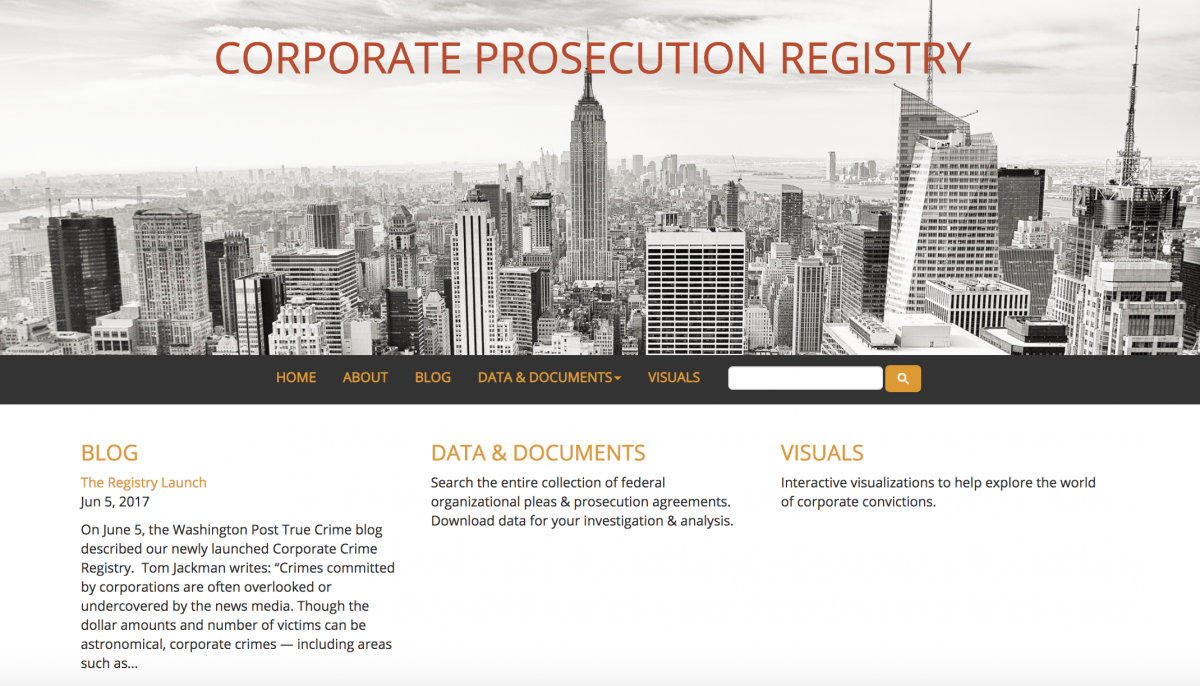
Crimes committed by corporations are often overlooked or undercovered by the news media. Though the dollar amounts and number of victims can be astronomical, corporate crimes — including areas such as securities fraud, money laundering and bribery — can be complicated, drawn-out matters which get lost in the daily blur of street crime and terrorism. But the need to hold large companies accountable remains, and a new way to understand and contextualize those crimes launched last week — a vast database of corporate prosecutions dating back to 1992, showing how the government did, or didn’t, resolve criminal cases with fines, prison terms or, sometimes, nothing.
The Corporate Prosecution Registry was created at the University of Virginia Law School by Professor Brandon L. Garrett and librarian Jon Ashley. It is searchable, sortable and downloadable. It features categories from antitrust violations to wildlife and workplace law violations. You can see that in 2007, a company called Great Cats of the World pleaded guilty in Oregon to selling endangered ocelots, with a link to the actual plea agreement. You can also see a 2006 agreement not to prosecute Hitachi for antitrust violations in the computer memory business in exchange for their cooperation with a federal investigation into that business.
There are more than 3,000 convictions of corporations and out-of-court prosecution deals with corporations, and it’s an immense, highly useful database all in one place. There are also a number of fascinating Justice Department internal documents, including memos from various attorneys general providing guidance on prosecuting businesses, and the U.S. attorneys’ manual on Principles of Federal Prosecution of Business Organizations. All of these are public documents, but never before gathered in one place as a resource for academics, lawyers, journalists and the public. Documents and dockets mined from the federal court database PACER as well as news releases and other records are available for immediate review.
Garrett is the author of the book “Too Big to Jail: How Prosecutors Compromise With Corporations,” which came in the wake of the federal government’s seeming lack of interest in pursuing institutions involved in the financial collapse of the late 2000s. While banks were bailed out with the claim that they were “too big to fail,” citizens lost homes, investments and life savings. But prosecutions did occur, as well as deferred prosecution agreements, and new Attorney General Jeff Sessions recently declared at a meeting of corporate compliance officers that “this Department of Justice will continue to investigate and prosecute corporate fraud and misconduct.”
Garrett said he and Ashley created the database because “we want people to know what types of corporations get prosecuted, how much they pay, and what the crimes are.” The Justice Department often issues statements that it has collected, for example, a billion dollars in fines in a year, Garrett said, without breaking down where those came from, or how that compared to previous years.
“We also want to see whether a billion dollars is a lot or a little,” Garrett said. “When you look closely, in some cases a billion is below the sentencing guidelines. All those zeroes may represent a lenient fine. You don’t know until you read the actual agreement.” In many cases, prosecutors have worked hard to craft an agreement which holds a company accountable for crimes such as fraud or environmental violations, “and we want to see what those companies have agreed to,” Garrett said.
Trends can also be tracked over the years, particularly since 2001 when data was more widely available through PACER, Garrett said. He noted that the Obama administration took significant steps to increase fines and deferred prosecutions that set conditions for companies to rehabilitate themselves to avoid prosecution. But that meant individual offenders were rarely prosecuted and many critics felt these deals were overly lenient. The database can be used to compare previous administrations with the new Trump administration, which has yet to announce any significant corporate prosecutions.
Garrett said the database had taken nearly 10 years to compile, and was available previously in a less user-friendly format. The new Corporate Prosecution Registry can be found here.
Originally published by the Washington Post
3 WAYS TO SHOW YOUR SUPPORT
- Log in to post comments













